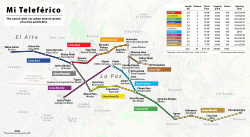Mi Teleférico
 |
|||

Red Line cable car connecting La Paz and El Alto
|
|||
| Overview | |||
|---|---|---|---|
| Native name | Mi Teleférico | ||
| Owner | Empresa Estatal de Transporte por Cable "Mi Teleférico" | ||
| Locale | La Paz, Bolivia | ||
| Transit type | Gondola lift | ||
| Number of lines | 4 (7 in planning) | ||
| Number of stations | 14 (14 in planning) | ||
| Website | www.miteleferico.bo | ||
| Operation | |||
| Began operation | 30 May 2014 | ||
| Number of vehicles | 443 gondola cars (Red, Green, and Yellow Lines), 208 (Blue Line) | ||
| Headway | 12 sec | ||
| Technical | |||
| System length | 14.7 km (9.1 mi) | ||
|
|||
Coordinates: 16°30′00″S 68°09′00″W / 16.50000°S 68.15000°W
Mi Teleférico (Spanish pronunciation: [mi tele'feɾiko], English: My Cable Car), also known as Teleférico La Paz–El Alto (La Paz–El Alto Cable Car), is an aerial cable car urban transit system serving the La Paz–El Alto metropolitan area in Bolivia. Four lines are currently in operation, and seven more are in planning or under construction. The system was built by the Austrian company Doppelmayr Garaventa Group. Phase One, which consists of the Red, Yellow, and Green lines, opened in 2014. The Blue Line, the first line in Phase Two, opened in 2017. The network currently consists of 14 stations, with interchanges at Chuqui Apu/Libertador (Yellow and Green Lines) and Jach'a Qhathu/16 de Julio (Red and Blue Lines). Two lines (Red and Yellow) connect the neighboring cities of La Paz and El Alto, which are separated by an elevation change of about 400 m (1,300 ft).
Upon the completion of the 10-kilometre (6.2 mi) Phase One in 2014, the system was considered to be the longest aerial cable car system in the world, and Phase Two will extend the system length by over 20 km (12 mi). While other urban transit cable cars like Medellín's Metrocable complement existing rapid transit systems, Mi Teleférico is the first urban transit network to use cable cars as the primary mode of transportation.
...
Wikipedia

